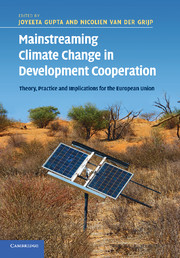 Mainstreaming Climate Change in Development Cooperation
Mainstreaming Climate Change in Development Cooperation Book contents
9 - The supply of aid and the need–supply nexus
Published online by Cambridge University Press: 07 May 2010
Summary
Introduction
This chapter examines the supply of assistance to developing countries (DCs) on the basis of an examination of Country Strategy Papers (CSPs; see Section 6.3.3). These papers are compiled in cooperation between partner countries and the European Commission and draw, where available, on Poverty Reduction Strategy Papers (PRSPs) prepared for the World Bank and IMF. The assumption behind such papers is that building on ‘national ownership’ of ideas for development assistance is likely to enhance the effectiveness of aid (see Chapter 2).
More recently, as climate change has become an issue of higher priority and the links between development and climate change have become more obvious, international organizations have started to recognize the need to mainstream climate change into these documents (see Chapters 3 and 4; Table 3.2). UNEP–UNDP (2007) explicitly see the PRSPs as an instrument for linking poverty and environmental issues (see Section 3.3.2), and argue that such reports could be seen as effective entry points for international assistance.
Against this background, this chapter seeks to ask to what extent the supply of development aid addresses the needs for climate assistance. In comparing the supply with the needs, it reflects back on the demand for climate assistance as identified in Chapter 8. The current chapter reviews the CSPs agreed between the European Commission and the 10 case-study countries (see Section 8.2).
- Type
- Chapter
- Information
- Mainstreaming Climate Change in Development CooperationTheory, Practice and Implications for the European Union, pp. 281 - 300Publisher: Cambridge University PressPrint publication year: 2010


